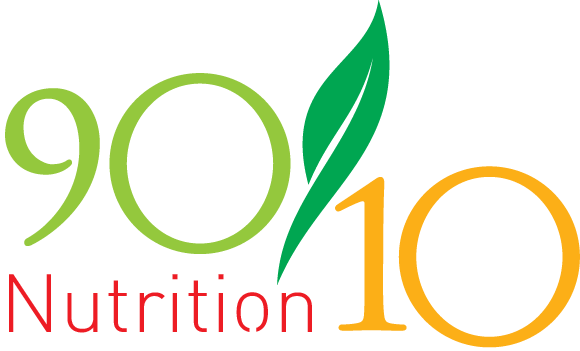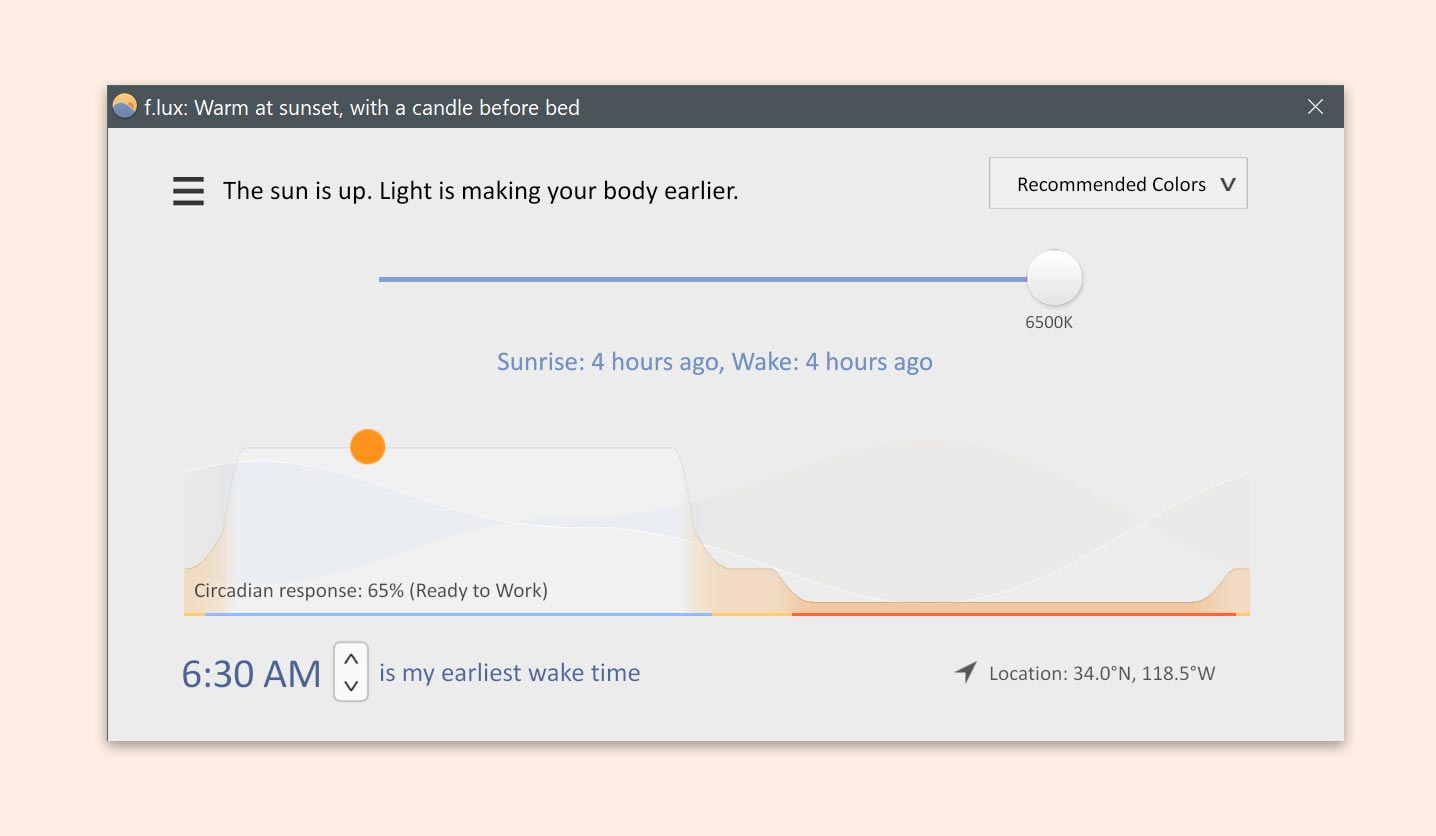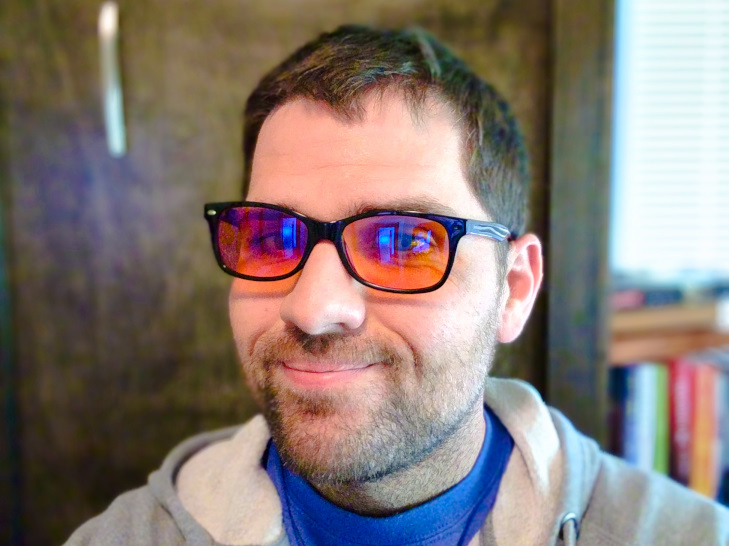I’m going to take a bit of a detour from nutrition on the blog today and ponder the question “How does blue light affect sleep?”
Honestly, the 90/10 program isn’t about weight loss or looking good in a bikini and it never has been. I mean, I don’t even wear bikinis 😜. The whole point is living a healthy life, and while I think that often starts with nutrition, it isn’t the only piece.
Sleep fits in with the “lifestyle” pieces of an overall healthy life and it can have profound affects on our health. I’ll likely be diving into lifestyle factors more and more on the blog. In fact, my recent blog on stress fits into this category as well.

When I say that I’m going to ponder the question “How does blue light affect sleep?”, I do mean ponder. I am by no means the expert on this subject. However, I find the data and implications to be extremely important.
What I’d like to do here is just start with some background on the subject so you understand the basic premise of how blue light affects sleep. Then, I’ll give some options for mitigating the affects of blue light on your sleep. Finally, I’ll give you some resources for further reading on the subject.
Background - Hormones And Sleep Patterns
Ugh! Do we have to talk about hormones? Well, yes…but just a little. I promise. Like I said, I’m not the expert here so I’ll bring this down into the simplest terms.
Here’s how it seems the body is programmed to work given the way our genes are right now:
🌒 When it’s dark, the body makes more of a hormone called melatonin. Melatonin’s primary job is to prepare the body for sleep.
🌞 When it’s light, the body makes less melatonin and more cortisol to signal the body that it’s time to wake up.
This process makes total sense and works quite well when you consider the life of humans before artificial light. Before artificial light, fire was really the only source of light after the sun went down (and before fire…well, there was no light after the sun went down). The red and yellow wavelengths of light from fire have very little affect on melatonin production.
The much shorter wavelengths of light from blue light are the most melatonin suppressing. Unfortunately, most of the artificial light we come in contact with on a daily basis is full of this blue light.
The biggest offenders are light-emitting screens such as those on your TV, iPad, tablet, phone, and computers. You can also get blue light from your normal house lighting.
So, how does blue light affect sleep? In a negative way by blocking melatonin production.
WE SCREWED IT UP….AGAIN
What I normally preach about on this blog is how we have screwed up our health by creating fake and harmful foods. In most cases, we did that for convenience, efficiency, and productivity (read as: MONEY). Then, I preach about how we can eat real food and have our health back.
Oddly, this subject takes the same basic format. We have screwed up our health for convenience, efficiency, and productivity again. Clearly, having artificial light has been a boon to our productivity. We are no longer slaves to the sun’s rising and setting, but the cost has once again been our health.
SLEEP IN YOUR BACK YARD?
So, what’s the answer now? Should we sleep in our back yards, use only candles in our house, throw out our computers and phones, and hunt food with our bare hands? Is that the answer?
While I suppose that is an option, I am more of a fan of finding a way to live within our current environment while doing our best to match our design. I don’t see shift work, indoor office environments, or after dark screen time completely going away any time soon (if ever).
So, what can we do to live within our current environment without living outside our gene programming?
How To Beat Blue Light And Keep Your iPhone
OPTION 1: BLUE LIGHT PROGRAMS FOR YOUR DEVICE
F.Lux is a computer program that changes the warmth of your computer screen light based on the time of day. If you’re getting most of your blue light after dark from screen time, this is a great option.
As far as I can tell, this is only on computers and isn’t for mobile devices at this time, but it may become available on mobile after this writing so check the app store. It looks like they also have an option for using the Philips Hue White and Ambiance kit to control your home lights as well.
A quick search of the Google Play store reveals several other options for blue light filters for your phone already though. Options include Twilight, EasyEyes and others. Twilight looks like a great option.
Apple now has a program that comes already installed on the iPhone called “night shift”. So, if you have an iPhone, you can use that to set times for your device to shift to warmer colors.
Installing programs like these on all of your devices to filter blue light at night is a great start toward reducing the affect on your sleep patterns.
OPTION 2: BLUE BLOCKER GLASSES
In my opinion, a more comprehensive and less intrusive solution is to simply get blue blocker glasses like these highly stylish and cool ones I am wearing in the photo below.
I like this option better than installing programs on all my devices because it blocks blue light from every source with one cheap and simple solution. I don’t have to change my lights and treat each source individually. I just put them on from the time the sun goes down until I go to bed.
The pair I am wearing in the photo is a pair of “Swannies” from Swanwick Sleep. I like them but have only been wearing them for a little while off and on at this point. I’ll update this blog with progress as I use them on a regular basis.
Other companies such as Uvex and Solar Shield make glasses as well and you can even get ones that go over prescription glasses. In addition, a company called SomniLight makes reading lights as well as glasses and night lights.
Resources For Further Reading
This blog isn’t meant to be the comprehensive source for information on blue light to definitively answer the question “how does blue light affect sleep?” I am really just diving into the subject myself and trying blue blocker glasses out in my own life.
For more comprehensive reading, often complete with links to scientific studies, check out some of these sources:
- Chris Kresser: “How artificial light is wrecking your sleep, and what to do about it”
- Mark’s Daily Apple: “How Light Affects Our Sleep”
- Healthline: “How Blocking Blue Light at Night Can Transform Your Sleep”






Comments (2)
Ok, I need those glasses, I’m an awful sleeper, no more than an hour and a half at a time!
I mostly sleep pretty well but for the times I don’t, maybe this is the reason. Thank you for this information!